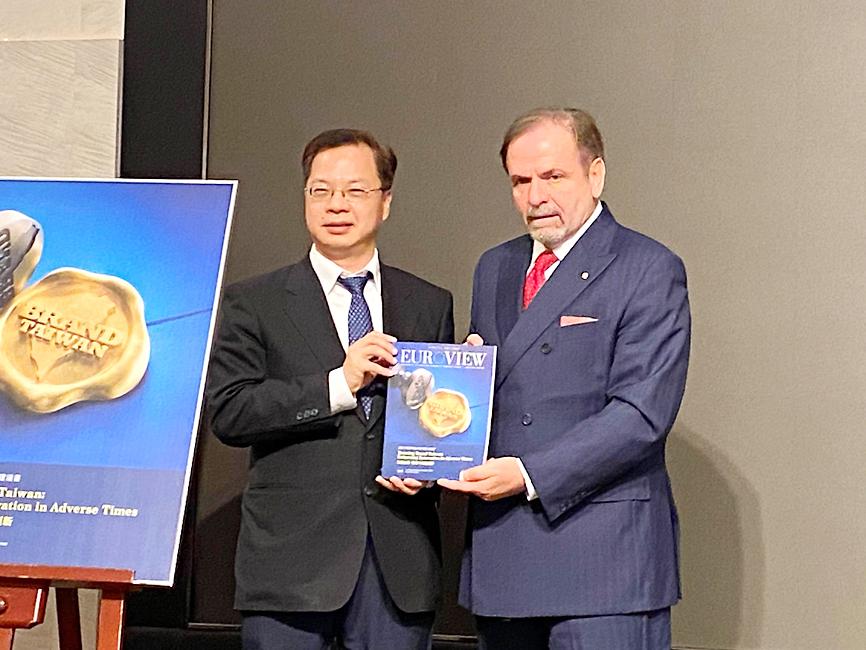Taiwan should seek to enhance innovation and promote itself as an international investment destination after effectively controlling the COVID-19 outbreak, the European Chamber of Commerce Taiwan (ECCT) said at a news conference to present its annual position paper.
“Taiwan has a unique opportunity to enhance innovation and promote it as an attractive investment destination, aided by its open society, a good geographical location, a reliable regulatory and legal system, abundant capital resources and a skilled workforce,” ECCT chairman Giuseppe Izzo said.
While Taiwan is less affected by the COVID-19 pandemic, it has to navigate the challenges posed by an aging society, US-China trade and other geopolitical tensions, and the rise of the gig economy, which continues to disrupt traditional employer/employee dynamics and erode social safety nets, Izzo said.

Photo: Wu Chia-ying, Taipei Times
Taiwan should boost its image as a haven for talent because the drive for innovation requires talented individuals and dynamic companies that cultivate and support them, the position paper said.
Taiwan’s successful handling of the pandemic already lends support to its image as a safe place to live and work, the trade group said.
However, more could be done to attract and retain talent in Taiwan, the chamber’s human resources and better living committees said, adding that foreign residents are denied the government-issued Triple Stimulus Vouchers and benefits for people aged 65 or older.
The committees called for equal treatment for foreign nationals and modernization of Taiwan’s labor laws to take into account the complexities of modern workplaces and remote working, which render overtime pay and clocking in irrelevant.
The chamber lauded Taiwan’s commitment to an energy transition away from fossil fuels to sources of renewable energy, and the electrification of the transportation sector.
However, more could be done to speed up decarbonization and work toward creating a circular economy, it said.
“The transition will require a roadmap with annual targets for a nationwide electric vehicle [EV] charging system, subsidies for the electrification of car parking lots at strategic locations and new building codes that give apartment owners the right to install EV charging facilities,” said Christine Herbst-Kubitz, co-chair of the chamber’s electrical engineering and equipment committee.
The government should adopt a stricter approach in dealing with heavy industrial electricity users to promote renewable energy, the chamber said.
Energy storage is a crucial component in energy policy panning given the intermittent nature of renewable energy sources, it said.
ECCT members urged the authorities to develop a policy framework for energy storage that is technology neutral and flexible enough to encourage the development and utilization of technological breakthroughs.

PROTECTION: The investigation, which takes aim at exporters such as Canada, Germany and Brazil, came days after Trump unveiled tariff hikes on steel and aluminum products US President Donald Trump on Saturday ordered a probe into potential tariffs on lumber imports — a move threatening to stoke trade tensions — while also pushing for a domestic supply boost. Trump signed an executive order instructing US Secretary of Commerce Howard Lutnick to begin an investigation “to determine the effects on the national security of imports of timber, lumber and their derivative products.” The study might result in new tariffs being imposed, which would pile on top of existing levies. The investigation takes aim at exporters like Canada, Germany and Brazil, with White House officials earlier accusing these economies of

EARLY TALKS: Measures under consideration include convincing allies to match US curbs, further restricting exports of AI chips or GPUs, and blocking Chinese investments US President Donald Trump’s administration is sketching out tougher versions of US semiconductor curbs and pressuring key allies to escalate their restrictions on China’s chip industry, an early indication the new US president plans to expand efforts that began under former US president Joe Biden to limit Beijing’s technological prowess. Trump officials recently met with their Japanese and Dutch counterparts about restricting Tokyo Electron Ltd and ASML Holding NV engineers from maintaining semiconductor gear in China, people familiar with the matter said. The aim, which was also a priority for Biden, is to see key allies match China curbs the US

Teleperformance SE, the largest call-center operator in the world, is rolling out an artificial intelligence (AI) system that softens English-speaking Indian workers’ accents in real time in a move the company claims would make them more understandable. The technology, called accent translation, coupled with background noise cancelation, is being deployed in call centers in India, where workers provide customer support to some of Teleperformance’s international clients. The company provides outsourced customer support and content moderation to global companies including Apple Inc, ByteDance Ltd’s (字節跳動) TikTok and Samsung Electronics Co Ltd. “When you have an Indian agent on the line, sometimes it’s hard

‘SACRED MOUNTAIN’: The chipmaker can form joint ventures abroad, except in China, but like other firms, it needs government approval for large investments Taiwan Semiconductor Manufacturing Co (TSMC, 台積電) needs government permission for any overseas joint ventures (JVs), but there are no restrictions on making the most advanced chips overseas other than for China, Minister of Economic Affairs J.W. Kuo (郭智輝) said yesterday. US media have said that TSMC, the world’s largest contract chipmaker and a major supplier to companies such as Apple Inc and Nvidia Corp, has been in talks for a stake in Intel Corp. Neither company has confirmed the talks, but US President Donald Trump has accused Taiwan of taking away the US’ semiconductor business and said he wants the industry back